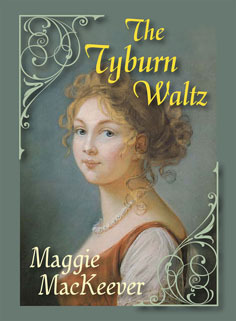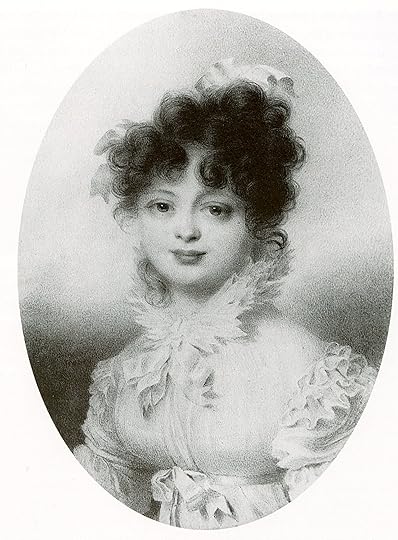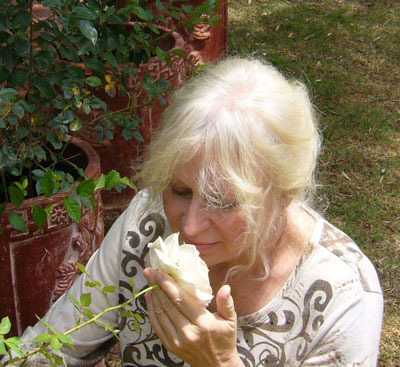Maggie Mackeever's Blog, page 4
November 20, 2010
Tyburn Guest Blog II
I was asked to write an article for The Romantic Times Book Review blog. It appeared on Nov. 9. They called it 'Maggie MacKeever and the Dark Side of the English Regency'. Here it is:
I was seduced by Georgette Heyer in the 70's, and haven't recovered from it yet. Since then I've written forty-three novels, most of them set in the English Regency.
The Regency was an era of contrasts, a time of artistic refinement and cultural achievement; social, political, and economic change; bloodshed and warfare. Regency London was an excellent example of the immense contrast between rich and poor. One street might be lined with noble colonnades, bow windows and gleaming doorknockers; the next with gin-shops, pawnbrokers and broken-down dwellings so squalid they oozed filth.
In THE TYBURN WALTZ, I wanted to show both sides of London, without being grimly serious about the business. Summer 1814 seemed the perfect time. Napoleon was safely ensconced on Elba and the Allied Sovereigns had invaded London, ostensibly to work out the details of the peace. However, Czar Alexander was more interested in sightseeing and basking in public admiration than in discussing affairs of state; his sister the Grand Duchess of Oldenburg was continually proclaiming her dislike of loud noises and music and especially the Prince Regent; Prinny was being driven to fits of frustration, Lord Castlereagh to wonder if the Czar might be half-mad, and Lord Liverpool to remark that people who didn't know how to behave should stay at home.
The background established, I next needed someone who could pass back and forth between both worlds. Not a West End character slumming, but an East End character crossing the class line.
Ragged urchins swarmed the warren of courts and alleys and lanes that lay between the rookeries and London's fashionable West End. Such children began to steal as soon as they could walk, frequently on the orders of adults who used them to make off with goods from places were larger thieves could not—food; small items of clothing, especially handkerchiefs; brooches and bracelets, combs and looking glasses from the stalls. Women waiting in the street hid stolen items in their barrows until it was safe to pass them on to a fence, or angling cove.
There were class lines in the rookeries, no less than between rich and poor. A nipper went from stealing apples to filching from stalls, and on to swiping stickpins and handkerchiefs. Natty lads aspired to be lifters and then knuckles, the better class of pickpocket who went to public places and snaffled pocketbooks, watches, and that sort of thing.
A shifting lad or lass seldom lived to an old age. His (or her) friends often accompanied him to the gallows, lending him support so that he might die game, and have his last speech written down and sold, and be talked of for a week.
We first meet our heroine in Newgate Prison, disguised as a boy. She is, she thinks, fourteen.
So that Julie can gain access to exclusive establishments, there to practice her pick-pocketing skills, she learns to act the lady, or at least sufficiently ladylike (she's prone to lapses) to serve as companion to the real thing.
Julie journeys back and forth between the two worlds, in one moment sitting meekly as behooves her position at the back of a theater box; in the next shimmying up and down drainpipes, scurrying across roofs. Part of the pleasure of writing this story was seeing these contradictory Londons through her eyes, and watching her change her opinions about a great many things, most especially the 'nobs'.
Julie removes items from Lady Jersey's ballroom; from Carlton House, right under Prinny's nose; from drawing rooms and bedrooms all around the town, not because she wants to, but because she has no choice.
From a certain earl she steals not only an ugly statue and his pocket watch, but also his heart.
Just as she stole mine.
I always feel sad when it's time to say goodbye to my characters and send them out into the world. I'm hoping that readers will fall in love with Ned and Julie too.
Filed under: Writing








November 10, 2010
Tyburn Guest Blogs
Because of The Tyburn Waltz, I've recently been invited to guest blog, which was a lot of fun. Here's the first, which appeared on The Regency World of Author Lesley-Anne McLeod (http://www.lesleyannemcleod.com/) on October 29.
GRAND DUCHESS CATHERINE OF OLDENBURG
In the course of doing historical research, one encounters intriguing characters. One of my current favorites is the Grand Duchess Catherine of Oldenburg.
In June of 1814, the allied sovereigns of Russia and Prussia arrived in London on a visit to the Prince Regent. With them came the two sons of the King of Prussia and a large number of victorious field-marshals, generals, princes, dukes, barons and the like.
They were a colorful cast of characters. Among them was the Grand Duchess of Oldenburg, favorite sister of Czar Alexander of Russia. She had actually been in London since March. On her arrival, the wife of the Russian ambassador, Countess Lieven, immediately foresaw trouble. 'The Grand Duchess has an immoderate thirst for authority and a very high, and possibly excessive, opinion of herself. I never saw a woman so possessed of the need to stir, act, put herself forward and eclipse others'.
In other words, the Grand Duchess was a pill.
She was also politically influential and during 1812-15 formed and paid to outfit a special regiment of chasseurs. She dominated a reactionary political group. In 1812 a group of conspirators unsuccessfully planned to depose Alexander and put her on the throne as Czarina Catherine III Pavlovna.
She was 'seductive in glance and manner', had 'a dazzling brilliance and freshness of complexion, a bright eye, and the most beautiful hair in the world… She expressed herself directly, with eloquence and grace, but she never abandoned the tone of command. Her mind was cultivated, brilliant and daring; her character firm and imperious'.
Catherine had a fondness for personal adornment. 'She was dressed in the most magnificent pearls I ever saw – scattered all over her head in large bunches and drops. She wore a necklace of egg-shaped pearls of enormous size.'
At the time of Catherine's arrival in London, the Regent was anxious for a match between his daughter Charlotte and the Prince of Orange. Such an alliance was regarded with alarm in St. Petersburg. Some believe that the Grand Duchess had been sent to London on a secret diplomatic mission, and that she was instrumental in the match being called off.
Another theory is that she came to England to cement the Anglo-Russian alliance by a second marriage. However, though impressed by Britain's material achievements (particularly the steam-engine) she was less enamored of its reigning house. The Dukes of Clarence and Sussex struck her as uncultivated boors. She and Prinny took each other in immediate dislike.
Her brother agreed. Alexander called the Regent 'a poor sort of prince'.
The Grand Duchess derived great pleasure from putting Prinny in positions of acute embarrassment. She stirred up trouble with regularity and created countless scenes; for example, leaving the room immediately the Prince's orchestra struck up. She was also subject to fainting fits. Her nerves had allegedly been ruined during the burning of Moscow, during which she was confined in a palace along with her youngest child.
The Grand Duchess outdid herself during a banquet held by the City of London at the Guildhall on June 18th. The occasion was supposed to have been exclusively masculine, but Catherine insisted on attending. When the musicians struck up a tune, she threatened to pitch one of her fits. Prinny was forced to beg that she allow the national anthem to be sung. At length she conceded, causing Lord Liverpool to remark that if people didn't know how to properly behave, they should stay at home.
No one was unhappy when the Grand Duchess departed English shores.
Catherine Pavlovna of Russia was the fourth daughter of Czar Paul I of Russia and Princess Sophie Dorothea of Württemberg. In 1809, she married Duke George of Oldenham, who died of typhoid in 1812. While in England she met Crown Prince William of Württemberg, who was married to Princess Charlotte of Bavaria. He divorced his wife and married Catherine in 1816, thereby making her the Queen of Württemberg.
She had two sons with her first husband and two daughters with her second.
Catherine died in January 1819 of a bacterial skin infection complicated by pneumonia. She was forty years old.
Filed under: Writing








September 30, 2010
The Last, Best Romance
 Julie expects she will end up dangling on Tyburn gallows, hanged as a thief.
Julie expects she will end up dangling on Tyburn gallows, hanged as a thief.
Ned expects he will die on the battlefields of the Peninsula, hanged as a spy.
But then Julie takes on the trappings of a lady, and Ned unexpectedly becomes an earl, both players in a deadly game that will take them from the heights of London society to the depths of the Regency underworld — a game in which not only necks are risked, but hearts as well.
EXCERPT:
Her hands were tied in front of her. Wisdom dictated that he leave them safely bound. Surprisingly elegant hands they were, the fingers slender and graceful underneath their dirt.
Ned set aside his firearm, unfastened the cords that secured her ankles, rubbed the soft flesh where the bonds had chafed. Her bones were small, delicate, finely formed. She cursed and tried to kick him. He experienced an absurd impulse to pick up this defiant scrap and hold her safe from the world.
Well, why not? If he could hardly hold a housebreaker safe, he could certainly still hold her. Ned untangled his captive from the chair; scooped her up, drapery and dirt and all, and sat her on the desk. The fabric parted, revealing one smooth and slender shoulder, and the curve of one plump breast. She clutched the curtain closer and scowled.
Here was a female unimpressed by his title. Ned trailed one finger down her soft cheek. "Tell me your name."
She turned her head and bit his wrist; at the same time planted her bare foot in his groin. Abruptly, Ned released her. "Point taken," he said and then cursed as she grasped the ugly statue in her bound hands and aimed it at his head.
Caught off-balance, Ned stumbled backward. The thief scooted off his desk. He grabbed for her, caught the curtains. She brought the statue down, hard, on his skull. Tangled up in dusty draperies, Ned crashed to the floor. He'd not soon forget his last glimpse of the housebreaker, scrambling mother-naked out his library window, clutching his ugly statue in her hand.
Damned if he'd enjoyed anything so much since he departed the Peninsula. When Bates returned to the library, he found his master holding a bloody handkerchief to his head, and laughing like a loon…
Coming November, 2010 from Vintage Ink Press
ISBN 978-0-9826239-3-0
Genre: Historical Romance
Trade paperback, 281 pages
Price: $12.99
Distributed by Ingram Books. Available online through Amazon, Barnes and Noble, The Book Depository
Ebook versions: epub, pdf, Kindle
Excerpt Copyright 2010 by Gail Clark Burch
Filed under: Writing 







August 2, 2010
Going on Hiatus
June 20, 2010
New Cat On The Block
I think it's pretty obvious that I'm no blogger. There aren't enough hours in the day. Among the posts I've not gotten around to writing are:
(1) Lee And The Squirrel. I feed the critters, Lee feeds the birds — and, consequently, the squirrels. We have several feeders hung in the olive tree. One squirrel in particular (known as That Little Shit) is forever climbing down the chain to get at the bird seed. He climbs down, Lee gets up to chase him away, he climbs up into the tree and waits for...
March 24, 2010
VAMPIRE, BESPELLED
Several years ago I wrote a book called WALTZ WITH A VAMPIRE. It was the last of the books I did for Zebra's traditional Regency romance line, and it fell within those guidelines; early 19th century background, no explicit onstage sex. It was an odd little book that didn't really fall into any specific category — yeah, I had a vampire hero, but as opposed to angsting about his condition, he was more prone to enjoy himself ; while the heroine, instead of being appalled by the idea of...
February 20, 2010
Reviewing the Reviewers
These days, anyone can get published, and anyone can write a book review. Which in some ways is a good thing, and in some ways is not. I have Google alerts set up for Maggie MacKeever and was recently notified of a reader's review of one of my early books that called it 'dumb' and 'really bad'. I don't take these things too seriously any more — for every book that someone hates, there is at least one someone else who loves it — but I have a problem with people who review books without...
January 23, 2010
Regency Rug Rats
I'm trying not to be so critical of anachronisms — or at least, not so vocal — but 'rug rats' in a Regency romance is trying tolerance too far.
Did Jane Austen say 'rug rats'? Did Georgette Heyer?
They did not.
According to the Dictionary of American Slang, no one said 'rug rats' before the 1960′s. How does an author justify plopping 1960′s American slang into a novel set in early 1800′s England? How did her editor let it pass?
I surely can't be the only person who notices this sort of thing.
Revi...
December 21, 2009
'Tis The Season
Nights are getting chilly in L.A. One morning I found my car windows frozen shut. The outdoor cats have put on their winter coats. Patches looks like a big calico muff.
We've been rebuilding the carport — where I put out the dry food for the critters — and still have the big car-sized gate to go. I'm worrying about Pauly Possum and Mozart the Raccoon being able to get to the food once the area is totally closed in. The cats can and do slip under the smaller gate.
I voiced my concern to Lee...
October 12, 2009
New Maggie MacKeever Regency
THE WICKED MARQUESS is a traditional Regency. I feel like it should come with a label — Warning: No Explicit Onscreen Sex. The characters in the traditional Regency romance genre don't swing from chandeliers shouting the historical equivalent of 'do me now!' This particular story has quirky characters, humor, misunderstandings and muddled thinking, several surprises, and of course titillation. The characters may not indulge themselves onstage, but they certainly consider it. Frequently.
I've ...











